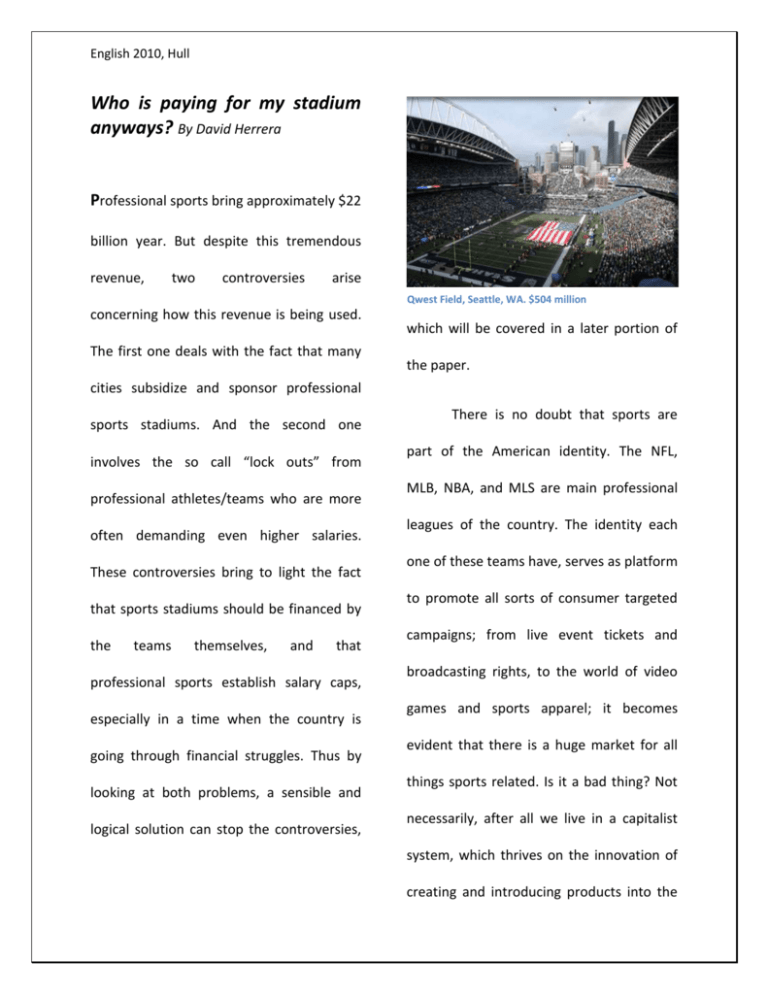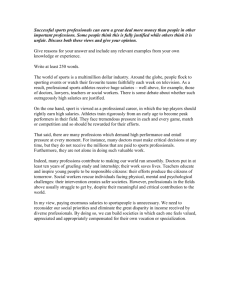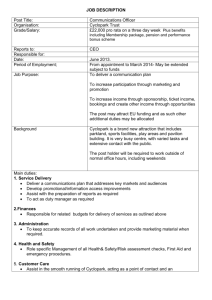Possition-Proposal Eng 2010
advertisement

English 2010, Hull Who is paying for my stadium anyways? By David Herrera Professional sports bring approximately $22 billion year. But despite this tremendous revenue, two controversies arise Qwest Field, Seattle, WA. $504 million concerning how this revenue is being used. The first one deals with the fact that many which will be covered in a later portion of the paper. cities subsidize and sponsor professional sports stadiums. And the second one involves the so call “lock outs” from professional athletes/teams who are more often demanding even higher salaries. These controversies bring to light the fact that sports stadiums should be financed by the teams themselves, and that professional sports establish salary caps, especially in a time when the country is going through financial struggles. Thus by looking at both problems, a sensible and logical solution can stop the controversies, There is no doubt that sports are part of the American identity. The NFL, MLB, NBA, and MLS are main professional leagues of the country. The identity each one of these teams have, serves as platform to promote all sorts of consumer targeted campaigns; from live event tickets and broadcasting rights, to the world of video games and sports apparel; it becomes evident that there is a huge market for all things sports related. Is it a bad thing? Not necessarily, after all we live in a capitalist system, which thrives on the innovation of creating and introducing products into the English 2010, Hull market, and then by the simple principle city hosting a stadium for a local team. To that if someone likes it, they buy it, and the an extent this makes sense, nevertheless, more you sell the better off your enterprise research shows that this statement is quite becomes. Thus far this model has worked misleading. Take into consideration the for professional sports, which has led to following excerpt from the book The Impact building more stadiums to house this iconic of The Growth Machine on Public Financing teams, and also has made many players and of Professional Sports Facilities: the case of agents very wealthy (for example the New the st. louis cardinals by Eric M. Click, where York giants yearly payroll to the building of two professional stadiums in $ 138,354,866) (USA Today). Again, are Cincinnati was the basis to discuss whether those outcomes bad? Well…not yet. or comes You make enough to pay for it not these facilities could create substantial jobs. It was claimed that 7,645 jobs would be created after a $520 Million The controversy over stadium funding arises over a very simple premise: If these teams are making so much money, and also spending so much money on salaries, why should states governments subsidize and even help with the funding of these facilities? One argument states the idea that sports can create jobs and bring revenue for the investment. The estimated cost of each individual job was projected to be $68,000. The following excerpt from the book illustrates the findings: When economists John Blair and David Swindell examined the $68,000 figure a bit closer, though, they discovered it was too low because the study's estimate of 7,645 new or saved jobs was too high. Blair and Swindell then reevaluated the report, corrected for double-counting and other English 2010, Hull problems, and concluded that only 3,530 jobs would be created or saved if the stadium proposal passed. Thus, the cost per job was actually going to run more than $147,000. In contrast, state economic development programs spend about $6,250 per job to create new job each of the States must face, deal with economic hardships and budget balancing. Civic pride and cultural identity do not pay the bills, and furthermore, do not justify the use of the tax payer’s money to justify those ideals. The economists in the previous example analyzed and demonstrated how in a I want a raise! practical sense, the investment in such an Interestingly enough, and rather expensive facility yielded practically no entertaining is the current and even past financial returns or benefits. What is even cries for just compensation demanded by more interesting is the idea that the jobs professional athletes. The reason this is created by these stadiums, actually cost rather comical, is that unlike, the stadium more than creating them by traditional funding ordeal, salaries are not about the means. community or civic pride, but rather about The opposition may argue that there are intangible returns/benefits finances. Quite a spin on the matter right! from Apparently is not enough reward to building stadiums or such sports facilities. be every child’s hero, or to be representing To a degree it is hard to argue with the civic your state in the high ranks of a sport, or pride and cultural value that a team brings even to make more money than the to a city or a state. Nonetheless the real president of the United States himself. problem the country and more specifically (Average baseball player makes more than English 2010, Hull $1 million a year, president makes around TEAM 400,000) (Smith) Boston Celtics $ 84,815,811 $ 4,989,165 $ 2,500,000 $ 6,616,121 $ 84,469,848 $ 3,839,538 $ 3,855,408 $ 3,512,009 $ 83,230,241 $ 4,623,902 $ 3,310,898 $ 5,137,811 $ 82,329,491 $ 5,880,677 $ 3,419,704 $ 5,973,445 that depend on sports; that is because they Portland Trail Blazers Memphis Grizzlies Orlando Magic Phoenix Suns $ 79,428,800 $ 4,412,711 $ 1,755,900 $ 5,766,456 Chicago Bulls $ 78,469,779 $ 3,566,808 $ 2,103,080 $ 3,509,114 realized that civic pride does not pay your All those “intangibles” are just intangibles, for players and all the industries TOTAL PAYROLL AVG SALARY MEDIAN STD DEV car and your house (more like a mansion). These figures alone, just for the NBA What is truly interesting is to look at reflect how sports can create a multibillion how much some teams spend on payrolls to dollar industry. With the current recession, get a glimpse of why it is perplexing to a lot and the demands from the sports unions, of American’s the idea that an NBA super one writer newspaper columnist noted the star should demand a raise: (for lack of following: more room, the top 10 highest payrolls are posted. Besides there aren’t enough digits in your calculator to add the payroll of all 30 teams) National Basketball Association Salaries 2009-10 NBA Salaries by Team TEAM TOTAL PAYROLL AVG SALARY MEDIAN STD DEV Cleveland $ 116,902,727 $ 5,082,727 $ 2,644,231 $ 5,699,573 Cavaliers New York $ 114,338,560 $ 5,716,928 $ 2,975,520 $ 6,502,783 Knicks Houston $ 92,713,977 $ 3,863,082 $ 2,216,157 $ 4,557,657 Rockets Dallas $ 88,312,340 Mavericks $ 5,887,489 $ 4,700,000 $ 5,387,320 Sure, baseball, like sports and movies were during The Great Depression, remains a valuable diversion from economic woes. But today's lavish salaries spending sprees are kicks in the teeth to the average American who's now clipping coupons, staving off home foreclosures, cringing at a plummeting 401(k) and ultimately footing the bill for the bigger team payrolls. How great will that $15 beer taste? How will the Angels' announced 6.4 percent hike in season-ticket prices feel? (Smith) English 2010, Hull In times were recession lurks over the average American, who usually is the one who doesn’t get a raise, and yet is willing and does spend money to see or support his or her favorite team; could use the idea that even the idolized team can “We may not see movement until it gets close to the end of the year,” said Marc Ganis, president and founder of the Chicago-based sports consulting firm SportsCorp. “Players have been so well paid for so long, they can hold out for longer than most of the other sports. NBA players don’t have the same [financial] issues as NFL players, who are very eager to get back on the field. (Shipley) take one for the team and hold on a raise. Granted the current issue on the The Solution NBA Lock outs (shut down of operations), Some states have started to put an deal with the proposal that the players 57% end to financing stadium. They are doing income from Basketball Related Income be this by creating laws that specifically define lowered, can be alarming to the players, it is what relationship exists between public a needed step after years of continuous funding, and stadiums. This approach is rapid growth that these players were reasonable way to put an end to using getting used to. taxpayer money to finance such facilities. At the end of the day, the bigger issue with After all simply by cutting back the salaries the lock out and the demands, is not how of players, a team will start saving money to much can the salaries be raised, but rather build their own stadiums. This helps solve who the problem over both salaries and gets the bigger chunk after redistributing the revenues. And as stated in the Washington Post recently: stadiums. English 2010, Hull For example one excerpt from the of money, tax payers could vote to help Law SB 630, from the state of Florida clearly subsidize part of the cost. Nevertheless that illustrate how the government can define should be the exception. this relationship: And in the words of Senator Bennett, the a governmental entity may not spend public funds in aid of a professional sports team, to pay for a facility used or intended to be used for a professional sports team, or for a sporting event of a professional sports team unless the expenditure has been approved by a majority vote of the registered electors residing within jurisdictional boundaries the matter can be summarize: Every person in this state who owns a home and has to see their property tax increase year by year, deserves not to have their hard earned money go to support a sports franchise, said Senator Bennett. It’s a matter of fairness. If you can pay someone $52 million to play the game of baseball, certainly you can build your own stadium with your own money. of the governmental entity. (Bennett) Conclusion Just because sports are a big part of the Even though the bill states that at some point the citizen can vote in for a stadium to American culture, it doesn’t mean it has to cost cities so much money to build and maintain their professional sport facilities. This is be build, which might seem contradictory at particularly critical today, and it will be in the first, but is quite reasonable since not all teams, or all leagues make the same amount. future as that money invested could be going to cover more beneficial programs in each state. English 2010, Hull Sources Alanez Tonya “Bill Filed To Prohibit Spending Public Money For Professional Sports Teams” South Florida Sun - Sentinel. Fort Lauderdale, Feb 17, 2011. pg. Web july 2, 2011 Bennett, “SB 630: Use of Public Moneys and Property” flsenate.gov, 2011. Web July 6, 2011 Smith, Marcia C. "In a down economy, professional sports franchises keep spending the money as usual." Orange County Register, The (Santa Ana, CA) 11 Dec. 2008: Newspaper Source. EBSCO. Web. 17 June 2011. Shipley, Amy. "Lengthy NBA lockout looms, with owners and players deeply divided." washingtonpost.com. June 29, 2011. Web. 3 Jul 2011. “USATODAY Salaries Databases” usatoday.com. 2010 Web. July 4, 2011 Pictures & Table Eagan, Andrew “America's Most Expensive Stadiums” Forbes Magazine, 2009. Web. July 5, 2011 “USATODAY Salaries Databases” usatoday.com. 2010 Web. July 4, 2011






